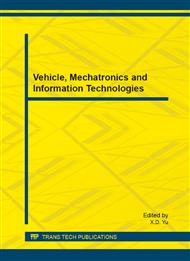p.3069
p.3073
p.3077
p.3082
p.3086
p.3089
p.3093
p.3098
p.3103
Performance Comparison between HEV with Three Different Battery-Ultracapacitor Systems
Abstract:
The Battery-Ultracapacitor System has the advantage of energy and power density, which suit to be used as energy storage system for HEV. This paper did the performance comparison of HEV with three different configurations Battery-Ultracapacitor System in normal and steep driving cycle respectively. According to the results, it summarized the technical advantages and the fitness for HEV of each system.
Info:
Periodical:
Pages:
3086-3088
Citation:
Online since:
August 2013
Authors:
Keywords:
Price:
Сopyright:
© 2013 Trans Tech Publications Ltd. All Rights Reserved
Share:
Citation:


